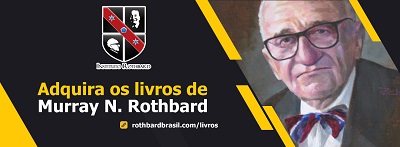REFERÊNCIAS
ANDREESSEN, Marc. Why Bitcoin Matters. 22 jan. 2014. Disponível em: <http://blog.pmarca.com/2014/01/22/why-bitcoin-matters/>. Acesso em: 26 jan. 2014.
BAGUS, Philipp. Monetary Reform and Deflation – A Critique of Mises, Rothbard Huerta de Soto and Sennholz. New Perspectives on Political Economy, Volume 4, Number 2, 2008. pp. 131-157.
______. Monetary Reform – The Case for Button-Pushing. New Perspectives on Political Economy, Volume 5, Number 2, 2009. pp. 111-128.
BERNANKE, Ben. Monetary Policy since the Onset of
the Crisis. Federal Reserve, 31 ago. 2012. Disponível em: < http://www.federalreserve.gov/newsevents/speech/bernanke20120831a.htm>. Acesso em: 27 dez. 2013.
BÖHM-BAWERK, Eugen. Whether Legal Rights And Relationships Are Economic Goods. Shorter Classics Of Eugen Von Böhm-Bawerk Volume I, South Holland: Libertarian Press, 1962.
BRITO e CASTILLO. Bitcoin: A Primer for Policymakers. Arlington: Mercatus Center at George Mason University, 2013.
BRITO, Jerry. The Top 3 Things I Learned at the Bitcoin Conference. Reason,
20 mai. 2013. Disponível em: <http://reason.com/archives/2013/05/20/the-top-3-things-i-learned-at-the-bitcoi>. Acesso em: 12 dez. 2013.
______. National Review Gets Bitcoin Very Wrong. Technology Liberation Front, 20 jun. 2013. Disponível em: <http://techliberation.com/2013/06/20/national-review-gets-bitcoin-very-wrong/>. Acesso em: 14 dez. 2013.
BUTERIN, Vitalik. Bitcoin Store Opens: All Your Electronics Cheaper with Bitcoins. Bitcoin Magazine, 5 nov. 2012. Disponível em: <http://bitcoinmagazine.com/bitcoin-store-opens-all-your-electronics-cheaper-with-bitcoins/>. Acesso em: 10 dez. 2013.
CHRISTIN, Nicolas. Traveling the Silk Road: A Measurement Analysis of a Large Anonymous Online Marketplace.Carnegie Mellon CyLab Technical Reports: CMU-CyLab-12-018, 30 jul. 2012 (atualizado em 28 Nov. 2012). Disponível em: <http://www.cylab.cmu.edu/files/pdfs/tech_reports/CMUCyLab12018.pdf>. Acesso em: 14 dez. 2013.
COLDEWEY, Devin. $250,000 Worth of Bitcoins Stolen in Net Heist. NBC News, 5 set. 2012. Disponível em: <http://www.nbcnews.com/technology/250-000-worth-bitcoins-stolen-net-heist-980871>. Acesso em: 14 dez.2013.
DAI, Wei. Bmoney. Disponível em: <http://www.weidai.com/bmoney.txt>. Acesso em: 21 dez. 2013.
DUNCAN, Andy. The Great Gold vs. Bitcoin Debate: Casey vs. Matonis. Lew Rockwell, 15 abr. 2013. Disponível em: <http://lewrockwell.com/orig11/duncan-a4.1.1.html>. Acesso em: 20 mai. 2013.
FARRELL, Maureen. Strategist Predicts End of Bitcoin. CNNMoney, 14 mai.2013. Disponível em: <http://money.cnn.com/2013/05/14/investing/bremmer-bitcoin/index.html>. Acesso em: 13 dez. 2013.
FONG, Jeff. How Bitcoin Could Help the World’s Poorest People. PolicyMic, mai. 2013. Disponível em: <http://www.policymic.com/articles/41561/bitcoin-price-2013-how-bitcoin-could-help-the-world-s-poorest-people>. Acesso em: 12 dez. 2013.
GERTCHEV, Nikolay. The Money-ness of Bitcoins. Mises Daily, Auburn: Ludwig von Mises Institute, 4 abr. 2013. Disponível em: <http://mises.org/daily/6399/The-Moneyness-of-Bitcoins>. Acesso em: 22 dez. 2013.
GRAF, Konrad S. Bitcoins, the regression theorem, and that curious but unthreatening empirical world. 27 fev. 2013. Disponível em: <http://konradsgraf.com/blog1/2013/2/27/in-depth-bitcoins-the-regression-theorem-and-that-curious-bu.html>. Acesso em: 22 dez. 2013.
______. The sound of one bitcoin: Tangibility, scarcity, and a “hard-money” checklist, 19 mar. 2013. Disponível em: <http://konradsgraf.com/blog1/2013/3/19/in-depth-the-sound-of-one-bitcoin-tangibility-scarcity-and-a.html>. Acesso em: 22 dez. 2013.
______. On The Origins Of Bitcoin. 3 dez. 2013. Disponível em: <http://konradsgraf.squarespace.com/storage/On%20the%20Origins%20of%20Bitcoin%20Graf%2003.11.13.pdf>. Acesso em: 5 dez. 2013.
GURRI, Adam. Bitcoins, Free Banking, and the Optional Clause. Ümlaut, 6 mai. 2013. Disponível em: <http://theumlaut.com/2013/05/06/bitcoins-free-banking-and-the-optional-clause/>. Acesso em: 13 dez. 2013.
HAYEK, F. A. Good Money, Part 2: The Standar, edited by Stephen Kresge. London: The University of Chicago Press Routledge, 1999.
______. A. Desestatização do Dinheiro. São Paulo: Instituto Ludwig von Mises Brasil, 2011.
HEARN, Mike. Bitcoin 2012 London: Mike Hearn. YouTube video, 28:19, publicado por “QueuePolitely,” 27 set. 2012. Disponível em: <http://www.youtube.com/watch?v=mD4L7xDNCmA>. Acesso em: 13 dez. 2013.
HUERTA DE SOTO, Jesús. Moeda, crédito bancário e ciclos econômicos. São Paulo: Instituto Ludwig von Mises Brasil, 2012.
HÜLSMANN, Jörg Guido. The Ethics of Money Production. Auburn: Ludwig von Mises Institute, 2008.
KAMINSKY, Dan. I Tried Hacking Bitcoin and I Failed. Business Insider, 12 abr. 2013. Disponível em: <http://www.businessinsider.com/dan-kaminsky-highlights-flaws-bitcoin-2013-4>. Acesso em: 13 dez. 2013.
KELLY, Meghan. Fool Me Once: Bitcoin Exchange Mt.Gox Falls after Third DDoS Attack This Month.VentureBeat, 21 abr. 2013. Disponível em: <http://venturebeat.com/2013/04/21/mt-gox-ddos/>. Acesso em 14 dez. 2013.
KEYNES, John Maynard. As Consequências Econômicas da Paz. Brasília: UnB, 2002.
KIRK, Jeremy. Could the Bitcoin Network Be Used as an Ultrasecure Notary Service? ComputerWorld, 23 mai. 2013. Disponível em: <http://www.computerworld.com/s/article/9239513/Could_the_Bitcoin_network_be_used_as_an_ultrasecure_notary_service_>. Acesso em: 13 dez. 2013.
LEE, Timothy B. An Illustrated History of Bitcoin Crashes, Forbes, 11 abr. 2013. Disponível em: <http://www.forbes.com/sites/timothylee/2013/04/11/an-illustrated-history-of-bitcoin-crashes/>. Acesso em: 13 dez. 2013.
LIU, Alec. A Guide to Bitcoin Mining. Motherboard, 2013. Disponível em: <http://motherboard.vice.com/blog/a-guide-to-bitcoin-mining-why-someone-bought-a-1500-bitcoin-miner-on-ebay-for-20600>. Acesso em: 10 dez. 2013.
MALTBY, Emily. Chargebacks Create Business Headaches. Wall Street Journal, 10 fev. 2011. Disponível em: <http://online.wsj.com/article/SB10001424052748704698004
576104554234202010.html>. Acesso em: 10 dez. 2013.
MATONIS, Jon. Bitcoin Prevents Monetary Tyranny, Forbes, 4 abr. 2012. Disponível em: <http://www.forbes.com/sites/jonmatonis/2012/10/04/bitcoin-prevents-monetary-tyranny/>. Acesso em: 15 mai. 2013.
______. Bitcoin’s Promise in Argentina. Forbes, 27 abr. 2013. Disponível em: <http://www.forbes.com/sites/jonmatonis/2013/04/27/bitcoins-promise-in-argentina/>. Acesso em: 12 dez. 2013.
______. How Cryptocurrencies Could Upend Banks’ Monetary Role. The Monetary Future, 15 mar. 2013. Disponível em: <http://themonetaryfuture.blogspot.com.br/2013/03/how-cryptocurrencies-could-upend-banks.html>. Acesso em: 22 dez. 2013.
MEIRA PENNA, J.O. de. Em berço esplêndido – ensaios de psicologia coletiva brasileira. Rio de Janeiro: Topbooks, 1999.
MENGER, Carl. On the Origin of Money. Economic Journal, 1892. pp. 239-255.
______. Principles of Economics. Traduzido por James Dingwall
e Bert Hoselitz, Free Press of Glencoe, Illinois, 1950; e New York University Press, Nova York 1981.
MIERS, Ian et al. Zerocoin: Anonymous Distributed E-Cash from Bitcoin, working paper, the Johns Hopkins University Department of Computer Science, Baltimore, MD, 2013. Disponível em: <http://spar.isi.jhu.edu/~mgreen/ZerocoinOakland.pdf>. Acesso em: 13 dez. 2013.
MISES, Ludwig von. Theorie des Geldes und Umlaufsmittel. Munique:
Verlag von Duncker & Humblot, 1924.
______. The Theory of Money and Credit. New Haven: Yale University Press, 1953. p. 462.
______. A verdade sobre a inflação. Instituto Ludwig von Mises Brasil, 27 mai. 2008. Disponível em: <http://mises.org.br/Article.aspx?id=101>. Acesso em: 16 dez. 2013.
______. Ação Humana: Um Tratado de Economia. São Paulo: Instituto Ludwig von Mises Brasil, 2010.
______. On Money and inflation – A Synthesis of Several Lectures. Auburn: Ludwig von Mises Institute, 2010.
NAKAMOTO, Satoshi. Bitcoin: a Peer-to-Peer Electronic Cash System, 2008. Disponível em: <http://article.gmane.org/gmane.comp.encryption.general/12588/>. Acesso em: 20 dez. 2013.
OBER, KATZENBEISSER e HAMACHER. Structure and
Anonymity of the Bitcoin Transaction Graph. Future Internet 5, no. 2, 2013. Disponível em: <http://www.mdpi.com/1999-5903/5/2/237>. Acesso em: 10 dez. 2013.
PAUL, Andrew. Is Bitcoin the Next Generation of Online Payments? Yahoo! Small Business Advisor, 24 mai. 2013. Disponível em: <http://smallbusiness.yahoo.com/advisor/bitcoin-next-generation-online-payments-213922448—finance.html>. Acesso em: 11 dez. 2013.
PIERRE. The Bitcoin Central Bank’s Perfect Monetary Policy. The Mises Circle, 15 dez. 2013. Disponível em: <http://themisescircle.org/blog/2013/12/15/the-bitcoin-central-banks-perfect-monetary-policy/>. Acesso em: 27 dez. 2013.
PINAR ARDIC, HEIMANN e MYLENKO. Access to Financial Services and the Financial Inclusion Agenda around the World. Policy Research Working Paper, World Bank Financial and Private Sector Development Consultative Group to Assist the Poor, 2011. Disponível em: <https://openknowledge.worldbank.org/bitstream/handle/10986/3310/WPS5537.pdf>. Acesso em: 12 dez. 2013.
REISMAN, George. Deflação, prosperidade e padrão-ouro. Instituto Ludwig von Mises Brasil, 16 ago. 2010. Disponível em: <http://mises.org.br/article.aspx?id=752>. Acesso em: 25 dez. 2013.
RICKARDS, James. Currency Wars. New York: Penguin, 2011.
ROTHBARD, Murray N. The Case for a 100 Percent Gold Dollar. The Ludwig von Mises Institute, Auburn University, Alabama, 1991.
_____. Economic Thought before Adam Smith: An Austrian Perspective on the History of Economic Thought. v. 1, Edward
Elgar, Aldershot, Inglaterra, 1995 (Edição espanhola, Unión Editorial,
Madri 1999).
_____. Classical Economics: An Austrian Perspective on
the History of Economic Thought, vol. II, Edward Elgar, Aldershot,
Inglaterra, 1995 (Edição espanhola, Unión Editorial, Madri 2000).
_____. Man, Economy and State with Power and Market. Auburn: Ludwig von Mises Institute, 2004.
_____. O que o governo fez com o nosso dinheiro? São Paulo: Instituto Ludwig von Mises Brasil, 2013.
RUSSO, Camila. Bitcoin Dreams Endure to Savers Crushed by CPI: Argentina Credit. Bloomberg, 16 abr. 2013. Disponível em: <http://www.bloomberg.com/news/2013-04-16/bitcoin-dreams-endure-to-savers-crushed-by-cpi-argentina-credit.html>. Acesso em: 12 dez. 2013.
SALMON, Felix. The Bitcoin Bubble and the Future of Currency. Medium, 3 abr. 2013. Disponível em: <https://medium.com/money-banking/2b5ef79482cb>. Acesso em: 13 dez. 2013.
SCHLICHTER, Detlev. Paper Money Collapse – the folly of elastic money and the coming monetary breakdown. New Jersey: John Wiley & Sons, 2011.
SENNHOLZ, H.F. Money and Freedom. Spring Mills: Libertarian Press, 1985.
SHOSTAK, Frank. The Bitcoin Money Myth. Mises Daily. Auburn: Ludwig von Mises Institute, 17 abr. 2013. Disponível em: <http://mises.org/daily/6411/The-Bitcoin-Money-Myth>. Acesso em: 22 dez. 2013.
SPARSHOTT, Jeffrey. Bitcoin Exchange Makes Apparent Move to Play by U.S. Money-Laundering Rules. Wall Street Journal, 28 jun. 2013. Disponível em: <http://online.wsj.com/article/SB10001424127887323873904578574000957464468.html>. Acesso em: 14 dez. 2013.
SPAVEN, Emily. Kipochi launches M-Pesa Integrated Bitcoin Wallet in Africa. CoinDesk, 19 jul. 2013. Disponível em: <http://www.coindesk.com/kipochi-launches-m-pesa-integrated-bitcoin-wallet-in-africa/>. Acesso em 12 dez. 2013.
ŠURDA, Peter. Economics of Bitcoin: is Bitcoin an alternative to fiat currencies and gold? Diploma Thesis, Wirtschaftsuniversität Wien, 2012. Disponível em: <http://dev.economicsofbitcoin.com/mastersthesis/mastersthesis-surda-2012-11-19b.pdf>. Acesso em: 15 abr. 2013.
TINDELL, Ken. Geeks Love the Bitcoin Phenomenon Like They Loved the Internet in 1995. Business Insider, 5 abr. 2013. Disponível em: <http://www.businessinsider.com/how-bitcoins-are-mined-and-used-2013-4>. Acesso em: 10 dez. 2013.
Triennial Central Bank Survey of foreign exchange and derivatives market activity in 2013. Disponível em: <http://www.bis.org/publ/rpfx13fx.pdf>. Acesso em: 10 jan. 2014.
TUCKER e KINSELLA. Goods, Scarce and Nonscarce. Mises Daily, Auburn: Ludwig von Mises Institute, 25 ago. 2010. Disponível em: <http://mises.org/daily/4630/>. Acesso em: 22 dez. 2013.
ULRICH, Fernando. Uma semana histórica para o Bitcoin. InfoMoney, 13 jan. 2014. Disponível em: <http://www.infomoney.com.br/blogs/moeda-na-era-digital/post/3143266/uma-semana-historica-para-bitcoin>. Acesso em: 13 jan. 2013.
WARREN, Jonathan. Bitmessage: A Peer-to-Peer Message Authentication and
Delivery System, white paper, 27 nov. 2012. Disponível em: <https://bitmessage.org/bitmessage.pdf>. Acesso em: 13 dez. 2013.
WILLETT, J. R. The Second Bitcoin Whitepaper. White paper, 2013. Disponível em: <https://sites.google.com/site/2ndbtcwpaper/2ndBitcoinWhitepaper.pdf>. Acesso em: 13 dez. 2013.
WOLF, Brett. Senators Seek Crackdown on ‘Bitcoin’ Currency. Reuters, 8 jun. 2011. Disponível em: <http://www.reuters.com/article/2011/06/08/us-financial-bitcoins-idUSTRE7573T320110608>. Acesso em: 14 dez. 2013.
WOODS Jr., Thomas E. Meltdown. Washington: Regnery Publishing, 2009.
World Bank Payment Systems Development Group, Remittance Prices
Worldwide: An Analysis of Trends in the Average Total Cost of Migrant Remittance Services. Washington, DC, World Bank, 2013. Disponível em: <http://remittanceprices.worldbank.org/~/media/FPDKM/Remittances/Documents/RemittancePriceWorldwide-Analysis-Mar2013.pdf>. Acesso em: 11 dez. 2013.
YUNUS, Muhammad. Banker to the Poor: Micro-lending and the Battle against World Poverty. New York: Public Affairs, 2003.










